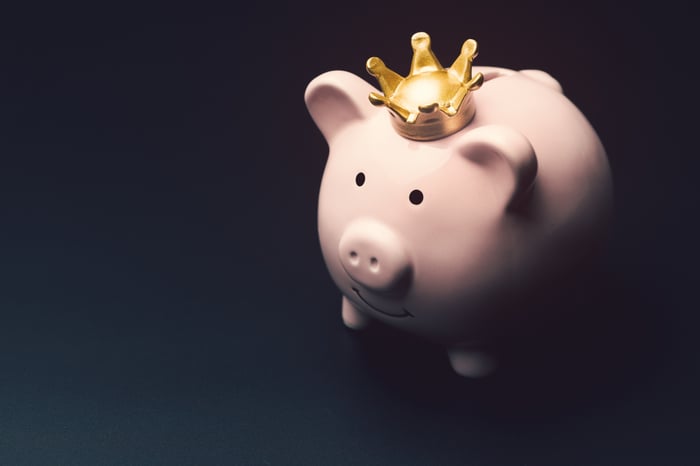Investors often turn to dividend stocks during periods of high inflation and slowing economic growth because of their reliability and stability. Such stocks also tend to outperform non-dividend paying ones.
The asset managers at Hartford Funds found that between 1930 and 1921 there has never been a decade when dividend stocks in the S&P 500 didn't generate positive returns. Even during the so-called "lost decade" of the 2000s when the index declined, income-generating stocks posted 1.8% gains.

Image source: Getty Images.
So it's understandable why people look for investment ideas among the Dividend Aristocrats. These are dividend-paying stocks in the S&P 500 that have increased their payouts every year for 25 or more consecutive years. Yet, of the thousands of stocks available, only a few dozen companies qualify as stock royalty. That shows it's a threshold not so easily attained.
There is one company, though, that will soon join those ranks, and investors may want to take a closer look at it as a possible addition to their portfolio.
An impressive record of achievement
Nike (NKE -1.30%) recently announced that its board of directors approved a quarterly dividend of $0.34 per share, which represents an 11% increase over the amount it previously paid.
The dividend hike represents Nike's 21st consecutive year of raising its payout, so it's on track to join that illustrious group of Dividend Aristocrats in just a few years. But it also displays a more impressive feat than simply tacking on another year of dividend increases. Every year for the past 12 years Nike has raised its payout by double-digit rates -- an impressive 12.1%, on average.
While the dividend yields only a modest 1.1% annually, its payout ratio (or the percentage of its profits that it pays out as a dividend) is a healthy 34%, meaning the dividend is safe and there is a lot of room for future increases to come. So there should be no interruption of its path to reach the 25-year threshold.
But let's look at its business, because that is what ultimately determines whether it continues paying a dividend, let alone increasing it.
Slowing global growth
There's no question Nike's hit a rough patch. The stock is down 40% from its recent highs (and even more than that until just recently) as sales growth slowed and profit margins narrowed. Much of the concern has to do with the undue size of the influence China's economy has on its performance.
Nike generates 13% of its revenue from China, down from 16% just last year as the country's zero-tolerance COVID policies have created tremendous upheavals to business. Individuals are still being locked at times in their homes, unable to go out to buy even the most basic necessities. As China's growth has dramatically slowed, Nike's fiscal first quarter sales there has tumbled 16% year over year.
Slowing economies elsewhere in the world, including here in the U.S., are also worrisome, as inventories are rising at their highest rate ever. It's forced the sneaker maker to try to liquidate some of its merchandise by discounting prices and selling items through its outlet stores.
The shortfall is causing Nike to be exceedingly mindful of costs, with one of the first casualties being its $15 billion stock buyback program, which still had about $5.6 billion remaining on it.

Image source: Getty Images.
Expanding for the future
Nike isn't in decline, though. Total sales still grew 10% year over year in the quarter as "brand digital" sales (those at its stores and on its website) jumped 23%. Gross margins did decline 220 basis points, but still stand at a hefty 44% level, though that contributed to a 20% decline in earnings per share.
Nike continues to invest in the metaverse, for good or ill, which currently seems to be a positive development for it. And it always has its vault of sneaker designs it can fall back on, such as its Michael Jordan lineup, which seemingly mints money every time a new edition drops.
It also announced it was expanding its physical retail presence by opening its first Nike Rise store in the U.S. It's one of a number of digitally focused concepts stores the apparel retail has rolled out over time, joining Nike Aventura, Nike Style, and Nike Live.
Don't just do it, though
Although this makes for a strong company over the long haul, its stock isn't really bargain-priced despite its recent fall. The shares trade for 28 times next year's earnings, 3.5 times sales, and 96 times the free cash flow it produces.
That argues for investors to not take big bites of the stock, but rather take a go-slow approach and buy shares on weakness over time. The strategy will allow you to build a position at better prices, but still benefit if the stock should soar. And all the while you get paid to own the stock as it marches toward its inevitable position as a Dividend Aristocrat.





